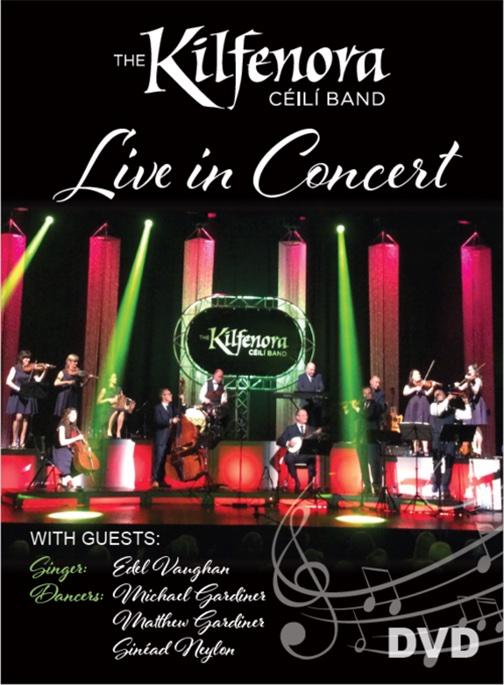September 6, 2022

“Live in Concert,” The Kilfenora Céilí Band • The Kilfenora Céilí Band has been around since before ceili bands were even a thing: As far back as 1888, it was a fife and drum band that, by about 20 years later, had morphed into the ceili band model as we know it today. Whatever your feelings about ceili bands – and no, not everyone likes them – there's no denying that Kilfenora is immensely popular as well as it is storied, and well. Beyond Ireland. So, with the pandemic causing difficulties in scheduling live appearances, in 2020 the band arranged to stage a concert for the purpose of making a DVD that would tide its many fans over until some degree of normalcy came along.
Kilfenora – much like traditional Irish music itself – has changed over the decades, having long since gone beyond playing for dances and competitions to also making concert and TV appearances while fashioning a more entertainment-oriented act: Occasionally employing arrangements more nuanced than the all-together-now ceili band format, incorporating tunes outside the ceili band canon, and collaborating with guest singers and set or step dancers.
Ultimately, however, they are what they are, a champion ceili band built around strict unison, tempo, and rhythm. And that's largely what you get on "Live in Concert," as Kilfenora's 13 members, who between them play 20 instruments (from fiddles and accordion to banjo, mandolin and drums, and even cello) perform 18 tune sets or songs with élan and gusto. About a third of the content is taken from their most recent CD, "Both Sides Now," which was produced by the estimable Donal Lunny (Planxty/Bothy Band).
Lunny’s association with the band is an example of Kilfenora's willingness to broaden, even stretch, its artistic reach. Their opening to the "Dinky Doofer" set – two polkas composed by the band's concertina player, Tim Collins – is a fascinating, slow build of repeated phrases, first on piano and gradually strings until flute and concertina take up the tune, with the other melody instruments coming in over the next two rounds; “The Coolaholliga,” the second tune in the medley, includes some sweet harmonies. Along similar lines is Kilfenora’s setting of “Little Bird,” a soulful, moderate-speed piece by Anglo-Irish guitarist/accordionist Tim Edey, opening with a banjo/cello pairing. It’s all very reminiscent of an ensemble like Lúnasa (whose Kevin Crawford also has worked with Kilfenora) or Boston’s own now-departed Childsplay.
More typical fare are the straight-ahead sets like “Molly Bán” and “Lillies in the Field,” both collections of reels, the “Our Last Night Together” hornpipe medley, and “The ’95 Jigs” – the latter being a medley the band debuted more than 25 years ago (not even one-fourth of Kilfenora’s lifespan). But it bears mentioning that where there is room for beauty and virtuosity in the classic ceili band sound, Kilfenora continually achieves this state of grace amidst the propulsion.
Kilfenora's acknowledgement of new directions also is reflected in their sets with three step dancers, brothers Michael and Matthew Gardiner, and Sinead Neylon. The Gardiners, Colorado-born of Irish parents, are “Riverdance” veterans and a social media phenomenon through their videos on Tik Tok and Instagram. Neylon is hardly one to overlook, though. All three are athletic and vigorous as they are highly skilled, and definitely lend a certain theatricality to their dancing.
“Live in Concert” acknowledges a sad transition: the death in 2020 of vocalist Jerry Lynch, whose family has extensive ties to the band – his father P.J. was its long-time leader and his brother John (mandolin, banjo) took up the mantle almost three decades ago. Fortunately, six-time All-Ireland champion and frequent Kilfenora guest Edel Vaughan is back to lend her sean-nos-influenced singing on Joni Mitchell's "Both Sides Now" (although she botches the words, repeating some of verse two in verse three), Collins’s “Clare My Heart, My Home” and two in Gaelic, “Na Chomaraigh Aoibhinn Ó” (by Maurus Ó Faoláin) and “Ardaigh Cuain” (Seán Mac Ambróis). These songs not only showcase Vaughan’s exquisite singing, but also Kilfenora’s ability to serve as a back-up band.
There’s certainly no issue with the music, or the overall performance on the DVD, but one might quibble about a few things. The editing for the sequences involving the dancers is not always quite as precise as one might like it to be – we get an occasional glimpse of the Gardiners and/or Neylon just a second or two after what might well have been a show-stopping sequence. Vaughn performs her segments on an adjacent stage (as do the step dancers), with large video screens behind her that show close-ups of band members as they accompany her; perhaps this set-up was supposed to emphasize the singer-band collaboration, physically separate though they might be, but it winds up being somewhat of a distraction.
Garry Shannon, Kilfenora’s animated flute and whistle player, provides introductions to some segments with a few quirky, folksy bon mots. But these take place in a studio setting rather than on the stage, which kind of raises the question as to why, if this DVD is supposed to replicate a Kilfenora concert experience, didn’t he just do the intros during that part of the filming? And why not have a few other band members have a turn?
Such details are unlikely to bother most Kilfenora fans, though. This will do fine until the real thing comes along again. (Nota bene: It actually has. Since the DVD was released, Kilfenora has appeared at the Fleadh Nua in Ennis and Fleadh Cheoil in Mullingar; they’re due to perform this month in Limerick and in Killarney the next.)

